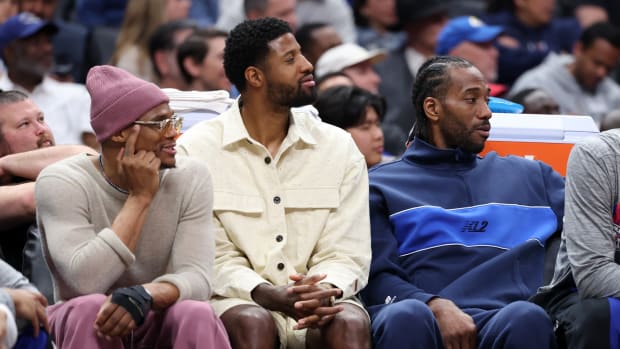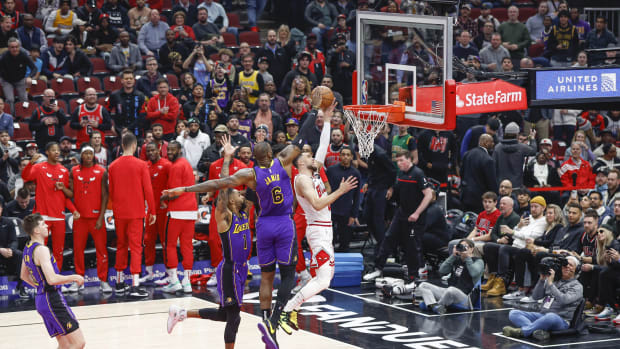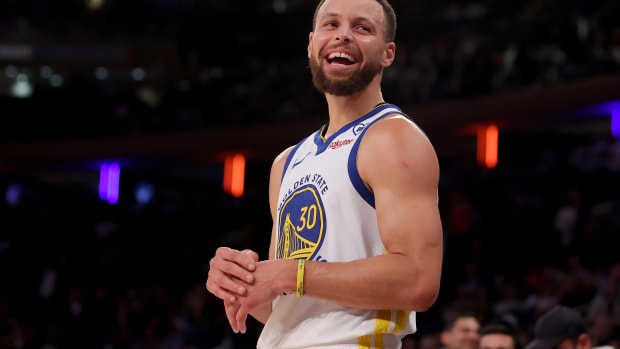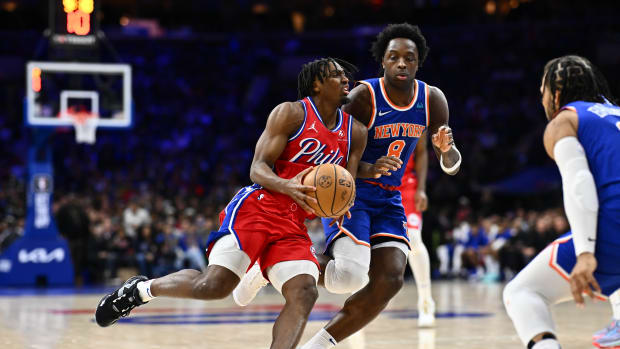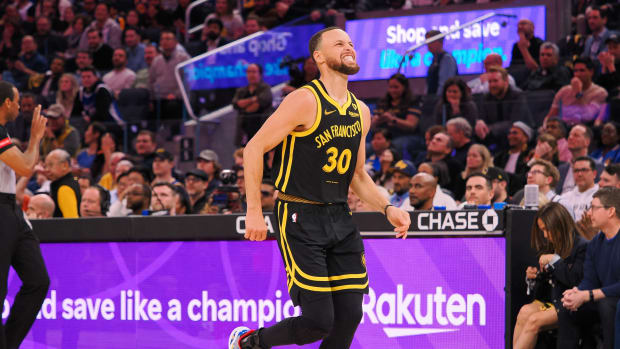
Three-Pointers: Spurs set the tone by clobbering the Blazers in Game 1
Tony Parker worked over Damian Lillard and the Blazers' defense in Game 1. (Garrett Ellwood/NBAE via Getty Images)
What looked to be a fascinating, competitive second-round series between the Spurs and Trail Blazers was, in its opening act, a bit of a massacre. San Antonio led by as many as 29 points and rolled 116-92 for a wire-to-wire victory on Tuesday in San Antonio.
SI’s 2014 NBA playoffs hub: Schedule, results and analysis
• Order is restored as San Antonio's offense executes to precision. In their first-round series against Dallas, the Spurs hit more snags in their offensive flow than could be reasonably expected. They seemed to work out those kinks just in time for a blowout win in Game 7, though with a new series came a new opponent and an entirely new metagame. Portland, while superficially similar to Dallas in some ways, is a challenge unto itself; the matchups, objectives and fundamental schemes in play are different, and so too would be the series.
So far that has turned out to be wildly in the Spurs' favor, as the vaunted San Antonio offense went off in Game 1 without a hitch. Tony Parker (33 points on 24 shots, nine assists, six turnovers), after six ho-hum games to start his postseason, embarrassed the cast of Blazer guards left at his mercy. Damian Lillard, one of the worst guard defenders in the league among regular starters, drew first watch on Parker and was promptly punked.
Mo Williams got his turn and had no better luck. Wesley Matthews finally slid over to try his hand, though his innately physical brand of defense seemed only to fuel Parker's free throw total. This might be as dominant as we've seen Parker all season, as should be the case when Portland has so few credible defensive options against him. Even cross-matching Matthews comes at a cost, and were Terry Stotts to bend further by lining up Nicolas Batum against Parker, he'd risk Kawhi Leonard going to work against a much smaller guard as a trade-off.
SI Roundtable: Picking the best matchups of the second round
More generally, the Blazers' periodic dependence on a tiny Lillard-Williams backcourt puts them in a hell of a spot in this series. That pairing worked out to be a solid net positive for Portland in Round 1, as there were enough places to hide one of the two guards as to preserve their offensive advantage. With the way the timing of those lineups broke in Game 1, however, one of Lillard or Williams was often stuck on Parker with the other checking Leonard -- all as Batum or Matthews focused their attention on Manu Ginobili.
Part of what makes San Antonio such a tough cover is the way they make opponents defend at every position. Lining up a weaker defender against a shooting guard might be the best course for Portland, though even then an active cutter like Danny Green or Marco Belinelli could spring free in such a matchup. The problem isn't simply who will guard Parker, but who players like Lillard and Williams can guard at all in this series.
• For the first time this postseason, Portland encountered genuine scoring obstruction. The difference in defensive imposition between the flaky Rockets and the crisp, fully-functional Spurs is nothing short of titanic. It's in that difference that we find the cause for Portland to shoot 38.5 percent from the field in Game 1 while turning the ball over on nearly a fifth of their possessions -- both dreadful marks by the Blazers' standards, in particular.
Portlandstruggled getting into its most basic actions on Tuesday, from the pick-and-roll down. Lillard (17 points on 15 shots, three assists, six turnovers) was thrown for a bit of a loop in the first half by how aggressively San Antonio was showing on LaMarcus Aldridge's high screens (a clear deviation from the Spurs' default) -- a strategy that held Lillard to just four points on 2-of-7 shooting before halftime while the Blazers got pummeled. Lillard worked his way around that pressure to better effect in the second half, though by then the game had essentially been decided and Portland's offense was hardly recognizable.
All flow was gone. The Blazers' best means of scoring in this game were concerted, telegraphed post-ups for Aldridge (32 points on 25 shots, 14 rebounds) on the left block. Those work well enough in small doses, though they're really just one oversimplified component of what is generally a much larger offensive package. An offense predicated on ball movement was held to just nine assists for the entire game, in part because San Antonio was so disruptive as to force Portland into the comfort of the basic.
MAHONEY: Best moments from the first round of the playoffs
That didn't offer much opportunity for kick-out or swing passes, as the Spurs were content to play Aldridge one-on-one so long as Lillard could be derailed and Portland's shooters were kept under wraps. Both goals were very clearly met in this opening contest.
Lillard struggled due to both the schematic tweak noted above and a vastly improved individual defensive performance from Parker. San Antonio's lead guard was genuinely pesky on D in a way he hasn't been for weeks, an important turn given how lifeless Parker looked in defending the likes of Jose Calderon and Devin Harris in the first round.
As far as controlling the three-point arc, for the entire game the Blazers went just 3-of-14 from long range. Those three makes tied a season-low. The 14 attempts stand as Portland's second-lowest total this year.
• Depth matters. Postseason basketball is typically understood to be the domain of starters; many coaches tighten their rotations over the course of the playoffs, with the climate of a particular series rendering some regular players less useful. The early subtext of this series, though, is the importance of bench play -- an area in which San Antonio has a commanding advantage.
Gregg Popovich again set himself apart in Game 1 by relying on a hefty cast of contributors: 10 Spurs logged six minutes or more in the first half on Tuesday to just six Blazers, and by game's end three San Antonio reserves -- none of them Manu Ginobili -- had scored in double figures.
While Blazers head coach Terry Stotts was coming to terms with just how few of his reserves seemed at all playable in this series, Popovich was drawing a 10-point, seven-rebound performance from Aron Baynes -- a bottom-of-the-barrel center who logged all of six minutes in the first round. While Williams contributed to Portland's defensive struggles, Belinelli (17 points on eight shots) and Patty Mills (10 points) helped lay it on the Blazers with perimeter shooting. San Antonio's subs won't be this good throughout the series on an individual basis, though collectively they have the talent and opportunity to make a considerable swing in the outcome of every game.
[si_video id="video_622881DB-3C77-F138-8E98-CDE5DA578EEC"]
More SI.com NBA playoff coverage
2014 NBA playoffs schedule, results | Series predictions| Season awards
PREVIEWS: Pacers-Wizards | Heat Nets | Spurs-Blazers | Thunder-Clippers
ROUNDTABLE: Best matchup of the second round? | Biggest disappointment
WATCH: Relive the best moments from the first round | Lillard's series-winner
STERLING COVERAGE: Sterling, NBA set for epic legal battle | Impact on Clips?































